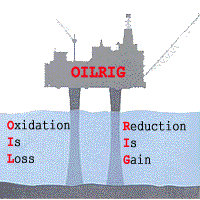| Reactivity series can be useful when it comes to predicting whether or not a reaction is likely to be possible. The term 'feasible' is used in the sense of 'reasonable', as regards what is known about the type of reaction under consideration. |
|
Predicting reaction
Once a reactivity series is constructed we can use it to predict the feasibility (probability) of a reaction occurring between any two pairs of reactants. This concept may be applied to all kinds of reactions, although we are mainly concerned with redox-type reactions here.
If one of the substances is a reducing agent - i.e. it reacts by losing electrons then this is likely to react with an oxidising agent - i.e. a species that gains electrons.
|
Potassium |
K+ + 1e |
best reducing agents (right hand side) | |
|
Magnesium |
Mg2+ + 2e |
||
|
Zinc |
Zn2+ + 2e |
||
|
Iron |
Fe2+ + 2e |
||
|
Copper |
Cu2+ + 2e |
||
|
Hydrogen |
2H+ + 2e |
||
|
Iodine |
I2 + 2e |
||
|
Bromine |
Br2 + 2e |
||
|
Chlorine |
Cl2 + 2e |
best oxidising agents (left hand side) |
Any species from the left hand side of one of the redox equilibria (the oxidising agent) can be predicted to react with any species above it on the right hand side of the redox equilibria (the reducing agent).
The species on the right hand side of the equilibria will lose electrons to go to the left hand side. They can only lose these electrons to species that are below them on the left hand side of the series.
We can therefore predict that chlorine (left hand side) will probably react with copper (right hand side) to form copper ions and chloride ions according to the equation:
|
Cl2 + Cu →
Cu2+ + 2Cl-
|
Similarly, we can predict that iodide ions (right hand side) will probably NOT react with zinc ions (left hand side), as the zinc ions are poor oxidising agents and the iodide ions poor reducing agents.
Question What does feasible actually mean in terms of reaction probability?
Although a reaction may be predicted to be feasible it does not mean that it will necessarily happen. If the activation energy is high then it may need an extra "push" to get it going. - For example the reaction between chlorine and hydrogen needs a spark, or ultraviolet light for a 'kick start', in which case it is explosively fast. Reactions that are dependant on the activation energy are said to be kinetically controlled.


